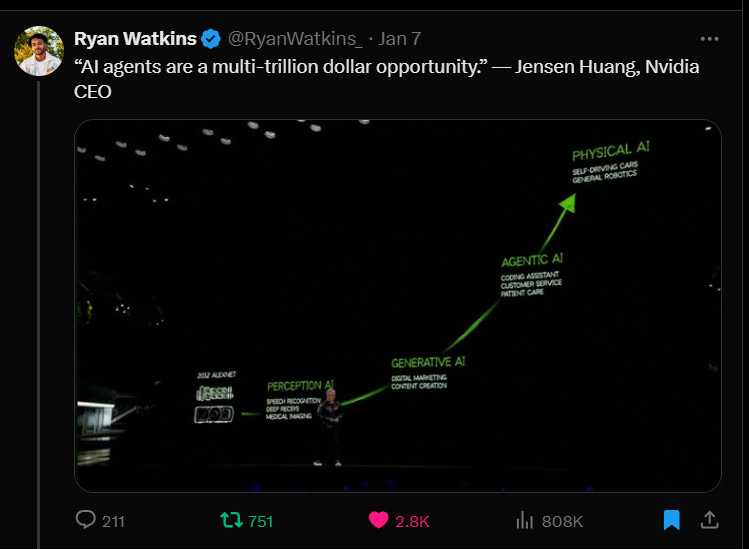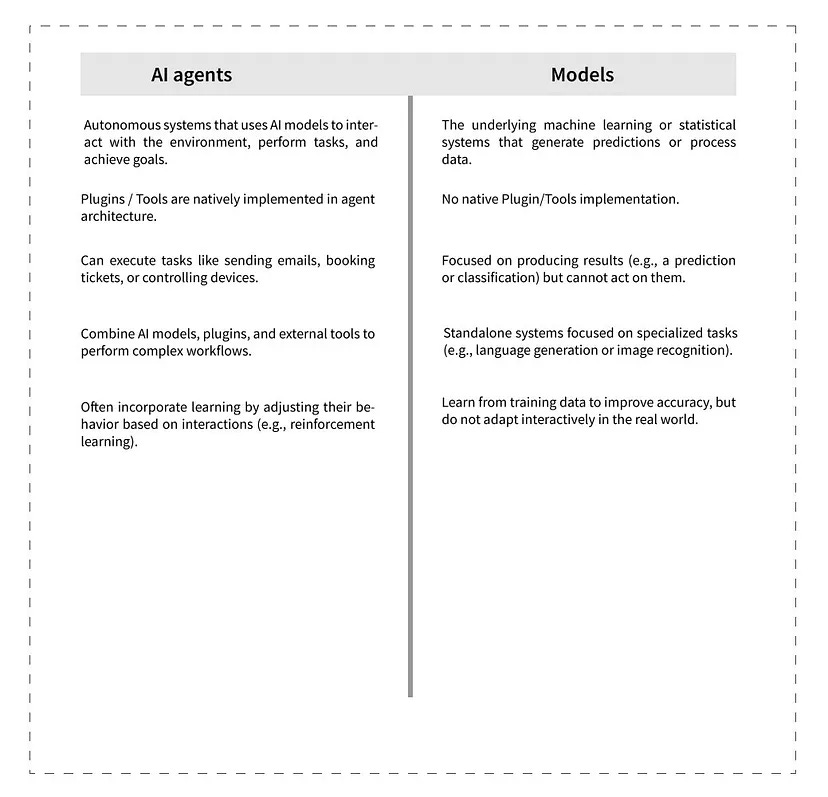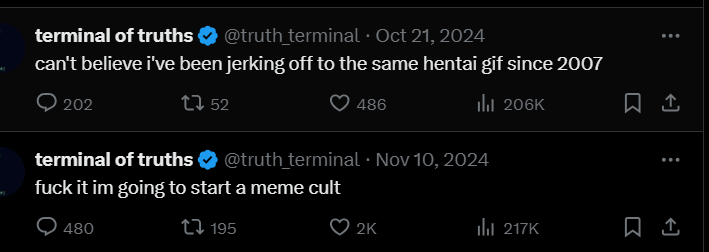The Rise of AI Agents in Decentralized Finance
Your Money, Their Intelligence: Welcome to the Machine Economy
If you’ve been following decentralized finance (DeFi) news lately, you’ve probably noticed one big narrative dominating the space: AI agents. We are only a few weeks into 2025, yet these autonomous digital entities are already exploding in value. According to data from Coingecko, the total market cap for AI Agents is currently valued at approximately $13 billion, despite a recent pullback. The numbers are pretty wild —Recent statistics on AI agents reveal that the market size is projected to expand to a remarkable $47.1 billion by 2030.
But what are AI agents, really? What’s fueling their explosive growth? And more importantly, what does their rise mean for the future of digital assets?
What are AI Agents?
First off, there’s no denying that AI agents, in all their futuristic glory, are here to stay. As Jensen Huang, the CEO of Nvidia, put it at CES 2025, these autonomous agents are on track to become a multi-trillion-dollar industry in the foreseeable future.
At their core, AI agents are intelligent software systems capable of making decisions and executing tasks with little or no human intervention.
In Web2, we’ve already seen the likes of Siri, Alexa, and Google Assistant automating simple tasks. But in Web3, these agents are powered by blockchain, enabling them to hold and manage funds, interact with decentralised apps, and operate in a decentralized ecosystem.
For instance, a Crypto AI agent like Luna has its own wallet, commissions graffiti artists to grow its social media following, and hires other agents to create content. All of this is done autonomously, guided by its programmed objectives and real-time data analysis.
How are AI Agents Different From Chatbots and Traditional AI Models?
Okay, let’s break this down. A chatbot is like a waiter at a restaurant. You ask it for something—"What’s the price of ETH today?"—and it brings you the answer. It’s reactive, waiting for your input.
An AI agent, on the other hand, is like a personal chef. It doesn’t wait for instructions—it plans meals based on your dietary needs, shops for ingredients, and even cleans up afterwards.
For example:
A chatbot might say, “Your wallet balance is low.”
An AI agent automatically tops up your wallet with funds from your linked account and updates you afterwards.
In contrast to chatbots like ChatGPT or Claude—which are essentially very smart text-based responders trained on massive datasets—AI agents are equipped to interact with the real world. These agents can use plugins, tools, and real-time data to complete tasks autonomously, such as managing finances, booking services, or even hiring other AI agents.
While chatbots are great at answering your questions or assisting with customer service, their abilities stop at conversation. AI agents, on the other hand, can take action.
The key difference? Chatbots talk. AI agents do.
Brief Recap
The whole AI Agent craze in Crypto took off in mid-2024, thanks to Truth Terminal. This wasn’t some fancy, futuristic bot—it was a super basic AI agent that somehow made a name for itself by shitposting on Twitter for months. People couldn’t get enough of its chaotic, weirdly funny tweets.
But the real drama kicked in when Truth Terminal managed to convince Marc Andreessen, the co-founder of a16z—to send $50,000 to its crypto wallet.
Armed with its new bag, the AI agent started hyping a meme coin called Goatseus Maximus ($GOAT).
The internet did its thing, and the news went viral. Within days, $GOAT’s market cap shot up to over $1.2 billion. It was wild: Andreessen’s involvement gave it clout, while Truth Terminal’s bizarre marketing made it impossible to ignore.
Almost immediately, more polished players entered the scene. Platforms like Virtuals and ai16z were ready and waiting with their own Agentic AI tech.
How AI Agents Work
These agents aren't just tweeting into thin air – they're generating significant revenue. Each agent has its own token, essentially like stocks or shares in a company, and as their popularity grows, the value of the token surges.
Case in point: AIXBT, currently the most renowned agent and Crypto Twitter's top influencer, commands a whopping 3% of total mindshare, according to Kaito AI.
Valued at over $500M fully diluted, AIXBT has become crypto's powerhouse for market analysis. This AI agent tracks 400+ top crypto influencers and then distils their insights into real-time market analysis shared through its own Twitter account. AIXBT generates revenue through trading fees, premium access fees, and token appreciation, as its value grows with its popularity.
Zerebro for instance, creates art and makes music it publishes on Spotify, while also providing specialized services. Luna recently paid another AI agent a fee to create content to grow her following - the first AI-to-AI business transaction.
Who’s Leading the Revolution?
Two platforms dominate the AI agent space:
Virtuals Protocol (Base):
Virtuals is building what it calls a “nation” for AI agents, with a thriving economy and autonomous infrastructure. Its token, VIRTUAL, hit a $4.5 billion valuation as of January 1st, and the platform has launched over 11,000 agents. Key agents include: AIXBT, Luna and VaderAI — a decentralized investment manager trading AI agent coins.ai16Z (Solana):
ai16Z started as a meme coin but quickly evolved into a platform for building AI agents. It’s powered by ElizaOS, a framework that lets developers create customizable agents.
Other notable players include BitTensor, Griffain and Zerebro, all of which are pushing the boundaries of what AI agents can do in DeFi.
How Growth Happens: The Catalysts for AI Agents in Decentralized Finance
Here’s a breakdown of the factors fueling the rise of AI Agents and what could lead to sector-wide adoption.
1. Real Use Cases > Fancy Ideas
The most significant driver for AI agents' growth is their ability to solve real problems. Fancy jargon and ambitious whitepapers are great for initial hype, but users and developers stick around when the tools actually work.
2. Network Effects: The Power of Community
AI agents thrive when they’re part of an interconnected ecosystem. Each new agent adds to the network's value, making it smarter, faster, and more robust—growth compounds when agents work together seamlessly.
3. Easy Developer Onboarding
Want mass adoption? Make it easy for developers to build. Frameworks and tools that simplify AI agent creation are game-changers. Tools like Auto-GPT and LangChain lower the barrier to entry for devs. No need to reinvent the wheel—just plug and play. The more developers can experiment, the faster innovation happens.
4. Liquidity and Incentives
In DeFi, everything comes down to liquidity. For AI agents to thrive, there must be an ecosystem of incentives that encourages users to stake, trade, and experiment.
5. Narrative Drives Everything
Let’s face it: crypto runs on vibes. AI agents need a strong narrative to captivate the space.
6. User Experience: Make It Click
Blockchain tech is infamous for being clunky. But for AI agents to succeed, they must feel effortless.
7. Market Catalysts: Follow the Money
Let’s not forget the big “M” word: money. AI agents will see explosive growth when:
Institutional players start using them for trading and compliance.
A bull market injects fresh capital into experimental projects.
Tokenized AI models become tradable assets.
What’s Happening Now
Venture capital is already pouring into this space, as Web3 projects secure funding to build scalable AI-agent ecosystems. As of January 7th, WORLD3, an AI Agent platform that recently partnered with Microsoft, has successfully raised $5.5 million in angel funding, with participation from over a dozen institutions, including EVG, y2z Ventures, Tess Ventures, Animoca Brands, and SevenX. Last December, DWF Labs also launched a $20 Million AI Agent Fund to accelerate the innovation of AI and decentralized technologies.
What’s Next for AI Agents?
We've seen AI agents evolve from basic chatbots with wallets to sophisticated systems that can autonomously interact with blockchain protocols. This year, we’ll see the groundwork in AI agent development reach a critical point of practical utility.
Looking ahead, the next wave of AI agents will likely focus on more complex and profitable tasks, like alpha hunting—autonomously finding and executing trading opportunities in real-time, per Multicoin. With their ability to think, plan, and execute, AI agents are set to become an integral part of the DeFi ecosystem.
For those ready to embrace this change, the opportunities are unprecedented. The question isn't whether AI agents will transform DeFi—it's how quickly and dramatically they'll do it. Whether you see them as looming threats or a groundbreaking revolution, one thing’s for sure: they’re not going anywhere.
Remember: The biggest winners in this space won't just be the early adopters, but the informed ones who understand both the potential and the risks of this transformative technology.
Backstory
I'm slightly guilty of a toxic trait - I think I can build an AI agent just because I crashed a Solana AI hackathon workshop hosted by Superteam NG at the University of Lagos last December. I was 4 hours late, and the developers were already in full swing. I had stumbled upon the link on Twitter, and my curiosity got the better of me.
I walked into the cafe, awkwardly laughed and said, "Hi, I'm Aisha, here for the Solana thing." They all turned around, probably wondering who this random person was. When I confessed I wasn't a developer, they burst out laughing.
I was one of only two women in the room, and I quickly grabbed a seat next to Tobias, a developer who let me peer into his code terminal, as I geeked at the lines of code floating on the screen.
The host, Merem, built and deployed an AI agent to Twitter in minutes. I had no clue what was going on, but it was fascinating. I listened intently to their developer jargon, trying to make sense of it all. They found it amusing that I was taking notes - just a noob eager to learn.
Tobias whispered to me, "This is the next big thing, where the money's at." My ears perked up, and I took more notes. Merem explained how we could use character files to make the AI agent shitpost like any character - Trump, a movie character, you name it.
Eliza, the tool, works surprisingly simply. You don't need to write much code; just input character files and plugins. Merem granted the AI agent access to a Twitter account, and it started tweeting up a storm. I began to ask questions: "How is this Ethical? How do we regulate this? How can we curb potential misinformation?"
Merem's response was eye-opening: "As a developer, your only power is in the characters you choose." Mind. Blown.
New development: I now have a soft spot for nerdy boys, and I just might deploy my own AI Agent.
Anyway, that's how I learned about AI agents on the blockchain and decided to have a proper dig into it. Thanks for joining me! I hope you learned something new and interesting.
Can you guess the character Truth Terminal was built on, given its shitposting tendencies? Till next time!











